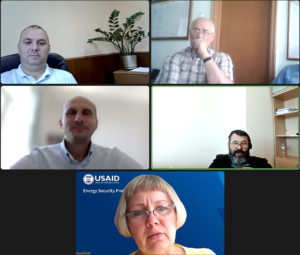The USAID Energy Security Project (ESP) has launched a series of events to give district heating companies (DHCs) thorough guidance and instruction about cogeneration units (CGUs). USAID ESP’s technical assistance will help DHCs prepare for the 2023-2024 heating season.

“This year, USAID ESP plans to deliver 41 cogeneration units for 19 cities in Ukraine, which will supply heat to more than 600,000 residents”,” said Diana Korsakaite, USAID ESP District Heating Sector Lead. To enable effective implementation and monitoring of cogeneration projects, USAID ESP is also collaborating with the Ministry of Communities, Territories and Infrastructure Development of Ukraine, the National Energy and Utilities Regulatory Commission, and the State Agency for Energy Efficiency and Energy Saving (SAEE) to improve the relevant legislation and regulatory framework. The resulting amendments will support DHCs to properly use CGUs and ensure an uninterrupted heat supply to Ukrainian consumers, especially under often emergency war conditions.
The first session, held on August 9, was about commissioning CGUs quickly, considering the coming winter. Representatives of heating companies from all over Ukraine discussed the technical, legal, and financial challenges that can arise, which include obtaining technical specifications to connect CGUs to the power grid; preparing design documentation; procuring auxiliary equipment; installing metering units; organizing effective financing; and obtaining the proper licenses to generate electricity from a CGU for a company’s own needs and provide excess heat supplies to the Integrated Power System of Ukraine.
Senior representatives of DHCs from Vinnytsia, Chernivtsi and Khmelnytskyi oblasts, shared their practical experiences addressing these issues. All have already experienced and mitigated these obstacles and problems and can now share lessons learned to help other DHCs learn and find sustainable solutions.
Maksym Bilyk, General Director of local DHC in Vinnytsia oblast, shared his practical experience in applying comprehensive, effective solutions in quickly implementing CGUs so they are ready for immediate use at heat supply companies. The communal utility has been operating a CGU at one of its facilities for more than ten years, and the unit generates electricity for the DHC’s needs. It has proven both its efficiency and reliable operation.
Oleksandr Dushenko, Director of the local DHC in Khmelnytskyi oblast, said they launched a CGU in December 2022. Mr. Dushenko advised his colleagues first to use the CGU to meet the company’s energy needs and then develop a separate project that connects the unit to the distribution system operator’s (DSO) grid.
In his opinion, this method allows heat supply companies to quickly involve CGUs in their work while at the same time developing the required design documentation and obtaining approval for connecting CGUs to the grid. Mr. Dushenko said it took 52 days from the day procurement started until the launch of the CGU. At the same time, for several months, the DHC was working to connect the CGU to the power grid.
During the workshop, participants discussed multiple practical solutions and recommendations to the various issues, allowing the participants to understand the advantages and disadvantages of expediting the commissioning of CGUs. In addition, all participants appreciated the role of cogeneration to facilitate and secure sustainable heat supplies for and during the upcoming heating season.

The second workshop took place on August 16, and participants discussed how the practical cooperative steps between cogeneration unit manufacturers, suppliers, and heat supply companies that receive CGUs from supplying, installing, and commissioning units.
Ievgen Khymoroda is a company director that supplies CGUs and identifies the three stages that take the most time to connect units. Depending on the project, these are obtaining technical specifications from an electricity and/or gas DSO for connection to the electricity and/or gas grids. In addition, preparing an environmental impact assessment and other similar measures for high-capacity facilities, which requires public hearings, also necessitates investments in time. “There may be a situation where the equipment is already in place, but the technical specifications are not yet available. It delays a project to connect a cogeneration unit, so we need to focus on these issues first,” Mr. Khymoroda said.
Among other things, workshop participants wanted to learn more about maintaining the units and training technical specialists who will operate the CGUs. As a part of a project to deliver 41 cogeneration units for 19 cities in Ukraine, USAID ESP plans to build the capacities of personnel that will be involved in operating the CGUs. It considers these pieces of training to be requirements for equipment suppliers.
According to Viktor Bilko, the Deputy Head of SAEE, the Agency is currently developing by-laws on the proper qualifications of CGUs under the EU Energy Efficiency Directive 2012/27 requirements. In addition, the adopted amendments of the legislation necessitate the guarantees of origin for the electricity generated by such installations. The authority to qualify cogeneration units and issue guarantees of origin is vested in SAEE, which will present the developed changes to secondary legislation soon.
“USAID ESP plans to hold several events to discuss key issues related to proper and effective use CGUs, including the selection of a unit; cost of gas as a fuel resource for CGUs; specifics of connecting and powering critical infrastructure facilities; installing metering units; innovations in the electricity market; and the peculiarities of work in the electricity market under new conditions, construction and installation works, commissioning.,” said Serhii Pinchuk, USAID ESP Heat Supply Expert.
USAID ESP experts expect that these meetings will help DHCs gain both practical experiences on the use of CGUs and a clear understanding of the legal norms and technical conditions of different types of units. The new knowledge and skills will help companies prepare for the 2023-2024 heating season and increase the cogeneration capacity utilization at heat supply companies in Ukraine.
“Cogeneration is not only an option to promote the efficient use of primary energy resources but also guarantees a more stable supply of energy to Ukrainian consumers. This is why USAID ESP is interested in providing as much information as possible to DHCs on the opportunities offered by CGUs,” said Serhii Pinchuk.
Since February 2022, USAID has raised $475 million in emergency funding to help Ukraine repair and maintain its heat and power supply systems. It includes assistance to millions of Ukrainians in the form of critical equipment to ensure power transmission and eliminate local outages; salt to prevent heating pipes from freezing; vehicle repairs to respond to russian attacks; and personal protective gear for Ukraine’s brave utility workers who are restoring damaged facilities.
